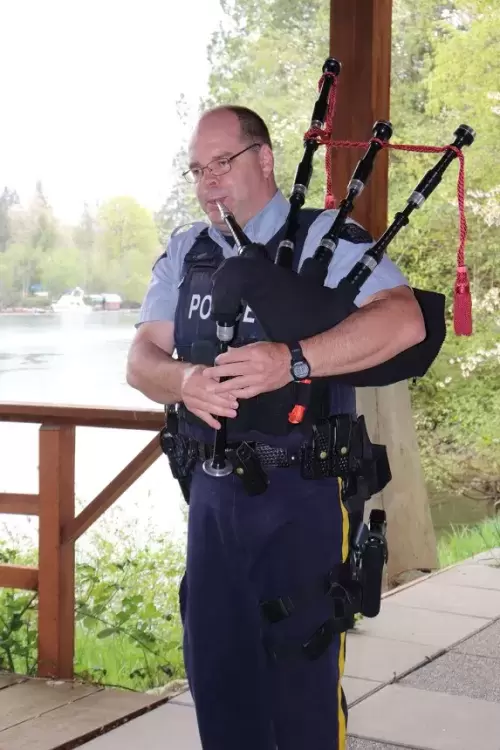In the quieter times of COVID-19 isolation comes an unusual sound, the mournful wailing of bagpipe music drifting over the Somass River. The piper is RCMP Constable Pete Batt and he played his pipes on the stairs of Tseshaht’s Maht Mahs gym on the morning of April 23.
One’s first thought might be that he is playing in remembrance of his comrade, Cst. Heidi Stevenson, who was one of 22 victims shot and killed in a murder spree that struck Nova Scotia over the weekend of April 18.
“I can’t say it wasn’t on my mind,” said Cst. Batt, who once lived in Nova Scotia. “I knew one of the victims and my father was an RCMP officer over there.”
But Cst. Batt was playing his pipes for another reason. A reason that celebrates cultural similarities.
Batt is a member of the Port Alberni RCMP detachment’s First Nations Community Policing Unit and has created a program to raise cultural awareness among students in the Alberni Valley.
“I have been working with cultural teacher Peggy Tatoosh in a culture share program with Grade 7 students,” said Cst. Batt. He spoke with Tatoosh about cultural parallels between Nuu-chah-nulth and his own Scottish heritage.
In Nuu-chah-nulth culture people did not enter a chief’s territory without first seeking permission. In the past, when the ocean was the main highway, the people paddled their canoes to the territories of other nations for many reasons. It could be to invite them to a potlatch, a request to visit or maybe to seek permission to harvest resources.
In modern times, the practice of seeking permission to land in the territory of another has been revived in the annual canoe journeys. The paddlers arrive at the landing singing. A speaker then informs the beach keeper of the nature of the visit and asks for permission to land.
Batt says a similar thing was practiced in Scottish culture.
“The chiefs would send pipers ahead to announce their arrival and to see whether the hosts were friendly or hostile,” said Batt.
The more pipers the Scottish chief had, the further their music carried and the more prestigious the chief was.
“We heard concerns from First Nations that they are not seeing us in this time of social distancing, but we are there,” said Batt.
After working with school students who looked at the similarities between First Nation culture and Scottish culture, Batt thought that playing his Great Highland Bagpipe when he arrives in someone’s traditional territory would be a good way to make his presence known.
“I played at Maht Mahs and also at Anacla on April 27,” said Batt.
He doesn’t know if anyone from Tseshaht heard him playing, but at Anacla he was warmly greeted by some of the people there who heard him playing.
“It lets people know we are here,” he said.
Batt has spent the past three years learning how to play bagpipes with his two children. He said his son is a far better player.
On April 28 Batts played Amazing Grace by the Somass River as a spring rain gently fell.
Through the Cultural Share Program students learn about similarities and form an appreciation for each other's culture. The Cultural Share Program is part of School District 70's official teaching curriculum.
Batts said that there is a teaching band in Port Alberni for anyone interested in learning to play the bagpipes.







